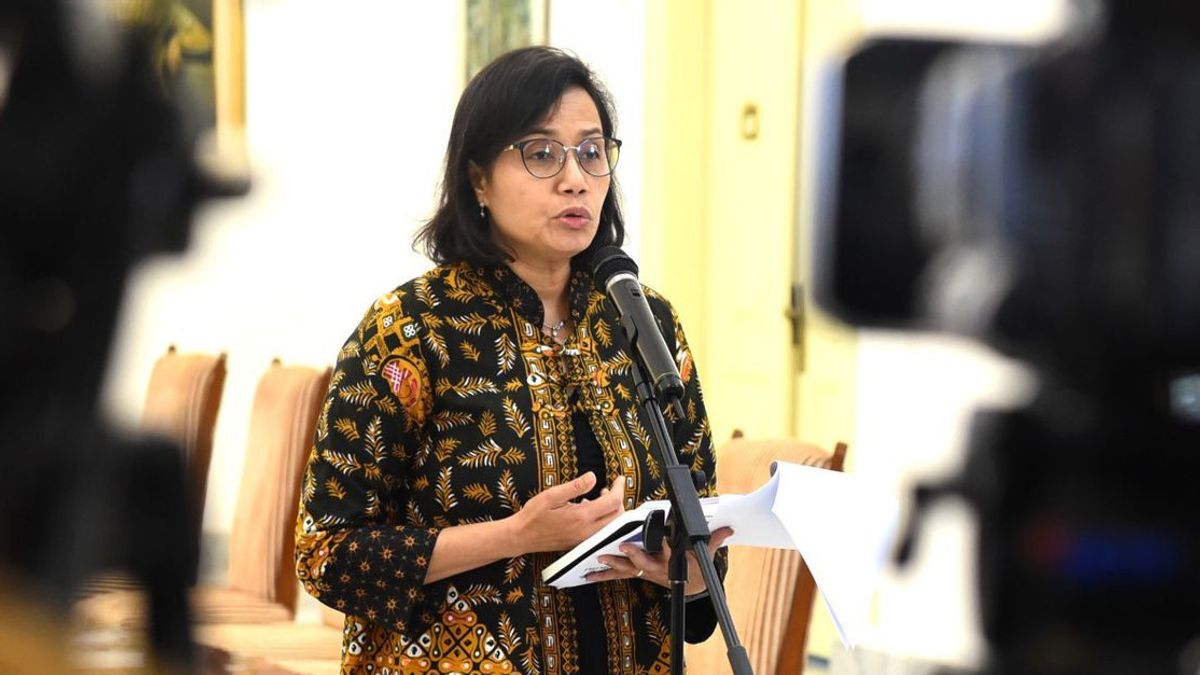JAKARTA – Finance Minister Sri Mulyani finally opened the voice related to the IMF (International Monetary Fund) correction on Indonesia's projected economic growth in 2021 from 4.9 percent to 4.3 percent.
"For all of us predictions are now subjective to uncertainty. So the assumptions are various, such as vaccination, there is a third wave of pandemic spread, and others," she said at the National Economic Recovery Acceleration Meeting in Bali that was broadcasted virtually, Friday, April 9.
According to Minister of Finance Sri Mulyani, the best thing the government can do at the moment is to optimize all resources, including creating targeted policies.
"But in terms of policy that we can form, is to continue to make budget adjustments. Therefore, in 2021 the government will make adjustment efforts," she said.
The move was claimed by Sri Mulyani quite successfully. This can be seen from the rate of growth contraction that is not very deep compared to some other countries.
"We've been able to withstand contractions not too deeply. If other countries can get to minus 8-9 percent, we are only minus 2 percent," she added.
Then, the former Managing Director of the World Bank also explained that in terms of the budget Indonesia has more volatility maintained.
"Our fiscal deficit is relatively smaller, which is 6 percent. Compare that with other countries that can reach double digits, such as the United States which reaches 15 percent," she said.
Furthermore, the Minister of Finance said the government still sees the vaccination process as the main game changer. Therefore, she hopes that the program can continue to be implemented so as to increase the confidence of the economic sector in order to accelerate the recovery faster.
"To date more than 12 million people have received the COVID-19 vaccine, and this is important to boost confidence in the economy," she said.
For the record, the IMF's international financial institutions have cut indonesia's economic growth projection for 2021 to 4.3 percent from 4.9 percent previously.
That assumption is based on two things. The first is the forecast of more moderate fiscal expansion while continuing to increase social spending and capital expenditures in the medium term.
Second, related to the monetary side with the main reference inflation that is still in trend until the close of the first quarter of 2021.
In fact, the government through the Ministry of Finance also took the same step by revising growth to 4.5 percent-5.5 percent from the previous 4.5 percent-5.3 percent.
Meanwhile, the monetary authority of Bank Indonesia (BI) cut from 4.8 percent to 5.8 percent to 4.3 percent to 5.3.
Vaccination program
The Institute for Economic and Community Research, University of Indonesia (LPEM UI) assessed the development of vaccination numbers, which now reach 9 million for the first dose and 4 million for the second dose is a good signal for economic recovery.
"But this number is still far from the threshold of herd immunity, provided that 181 million people or 360 million vaccinations (two doses)," said the LPEM UI report as quoted on Tuesday, April 6.
The think tank sees efforts to speed up vaccinations to achieve herd immunity as an important key to accelerating economic recovery.
Inflation ramps up
The Central Bureau of Statistics (BPS) recorded inflation of 0.08 percent month-to-month (m-o-m) in March 2021. The book is lower than February 2021 which is 0.10 percent and January 2021 with 0.26 percent.
The ramp up of the inflation rate, which is one of the indicators of economic activity, is also minimized by Bank Indonesia. The monetary authority said this development was influenced by the slowdown in inflation of the core group and administered prices, amidst the increase in inflation of volatile foods.
"Annually, inflation in March 2021 is recorded 1.37 percent (y-o-y), or down compared to the previous month's inflation of 1.38 percent (y-o-y)," said Bi Communications Department Head Erwin Haryono.
Credit expansion restrained
Signs of recovery that tend not to show significant results have an impact on demand for banking credit that is still depressed.
Based on data reported by the Financial Services Authority (OJK), the growth of the banking intermediation function in January 2021 contracted minus 1.92 percent on an annual basis with the realization to Rp. 5,391.7 trillion
Deeper pressure occurred in the period February 2021 with a record minus 2.15 percent y-o-y and the realization of credit disbursement to Rp. 5,419.1 trillion.
"Credit is still in the contraction zone," said OJK Board of Commissioners Chairman Wimboh Santoso, which was broadcasted virtually from Bali, Friday, April 9.
Nevertheless, he is confident that credit demand will continue to improve in line with the improvement of a number of indicators. One of them came from the tourism sector which showed signs of recovery in the new normal.
"Especially for hospitality, café, and restaurant please communicate with the bank to prepare the utility," said Wimboh.
*Read more information about ECONOMICS or read other interesting writings from Andry Winanto.
Other SOLID NEWS
SEE ALSO:
The English, Chinese, Japanese, Arabic, and French versions are automatically generated by the AI. So there may still be inaccuracies in translating, please always see Indonesian as our main language. (system supported by DigitalSiber.id)
















